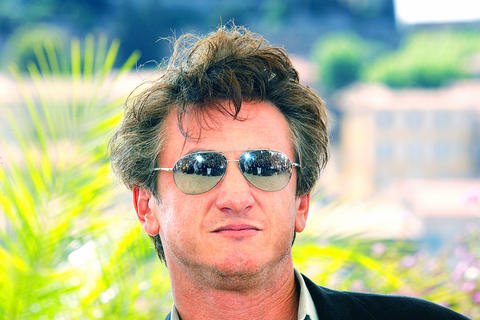American actor/director Sean Penn has been named to head the jury of the 2008 Cannes International Film Festival, organizers of the event announced yesterday.
In accepting the invitation, 47-year-old Penn said, "The Cannes Film Festival has long been the epicenter in the discovery of those new waves of filmmakers from all over the world. I very much look forward to participating in this year's festival as president of the jury."
Penn's latest directorial project, Into the Wild, which is based on Jon Krakauer's best-selling non-fiction book, is considered a strong candidate for an Oscar for Best Film of 2007.

PHOTO: EPA
His first film, The Indian Runner, which he wrote and directed, was presented at Cannes in 1991. His third movie, The Pledge, starring Jack Nicholson, was screened there 10 years later.
Considered one of the best American actors of his generation, Penn won the Oscar for Best Actor of 2003 for his performance in Clint Eastwood's Mystic River.
Festival artistic director Thierry Fremaux told France Info radio he considered Penn "a particular and unique American voice."

PHOTO: AFP
The Cannes film festival runs from May 14 to 25.
The European Commission said yesterday it would draw up plans to boost the online market for music, films and games while promising to uphold intellectual property rights.
The commission said content providers, telecom companies and Internet service providers should work together to make more online content available, while ensuring the robust protection of intellectual property rights.
Europe's content sector is suffering due to diverse and opaque rules on accessing online content amid "serious disagreements between stake-holders about fundamental issues such as levies and private copying," said EU Commissioner for the Information Society and Media Viviane Reding.
"We have to make a choice in Europe: Do we want to have a strong music, film and games industry? Then we should give industry legal certainty, content creators a fair remuneration and consumers broad access to a rich diversity of content online," she added.
Reding said she would make recommendations by mid-year "on new ways for achieving a single market for online content."
"The demand and preferences of 500 million potential consumers are the strongest arguments for achieving new solutions at EU level," she said in a statement.
The Commission also wants to facilitate copyright licences for online content covering several or all of the EU member states.
The commission said its research showed that a well-functioning single market for creative online content would strengthen competitiveness in Europe's music, film and games industry and allow the sector's retail revenues to quadruple by the end of this decade.
Last year was also a bad year for Lindsay Lohan, according to a new poll. Moviegoers tagged her with the year's worst performance by an actress.
Fifty-eight percent of voters in an online poll by AOL's Web site Moviefone gave Lohan that dubious honor for her turn as a woman escaping a sadistic killer in the box-office flop, I Know Who Killed Me.
The poll, which tallied more than 3.8 million votes, had more bad news for the starlet, who recently spent a brief stint in jail for drunken driving and cocaine possession and also attended voluntary rehab.
Another of Lohan's films, Georgia Rule, finished second among voters for biggest waste of US$10 spent on a movie ticket.
The No. 1 biggest waste? Norbit, a slapstick comedy starring Eddie Murphy, whose performance in the movie was the runaway pick for worst by an actor.
Voters were given five choices in each poll category. Two box-office smashes were voted the most worthy of the price of a ticket: The blood-soaked ancient war epic 300 edged out the sci-fi extravaganza Transformers, 28 percent to 26 percent.
A film dealing with the life of Hildegard Knef, the German actress who failed in her bid to become a Hollywood star in the late 1940s, but later gained fame as a husky-toned singer and writer in Europe, is to be made in Berlin and the US.
Shooting will begin in Berlin in the spring of 2008, and will be completed later in the US.
The movie is to be directed by Kai Wessel and will have the young German actress Heike Makatsch in the role of the glamorous Knef, who died in her home-town Berlin in February 2002, aged 76.
The movie, titled simply The Knev, is to focus exclusively on the years between 1947 and 1953, when the actress-singer-writer first left war-devastated Berlin in search of fame in Hollywood.

Behind a car repair business on a nondescript Thai street are the cherished pets of a rising TikTok animal influencer: two lions and a 200-kilogram lion-tiger hybrid called “Big George.” Lion ownership is legal in Thailand, and Tharnuwarht Plengkemratch is an enthusiastic advocate, posting updates on his feline companions to nearly three million followers. “They’re playful and affectionate, just like dogs or cats,” he said from inside their cage complex at his home in the northern city of Chiang Mai. Thailand’s captive lion population has exploded in recent years, with nearly 500 registered in zoos, breeding farms, petting cafes and homes. Experts warn the

The unexpected collapse of the recall campaigns is being viewed through many lenses, most of them skewed and self-absorbed. The international media unsurprisingly focuses on what they perceive as the message that Taiwanese voters were sending in the failure of the mass recall, especially to China, the US and to friendly Western nations. This made some sense prior to early last month. One of the main arguments used by recall campaigners for recalling Chinese Nationalist Party (KMT) lawmakers was that they were too pro-China, and by extension not to be trusted with defending the nation. Also by extension, that argument could be

Aug. 4 to Aug. 10 When Coca-Cola finally pushed its way into Taiwan’s market in 1968, it allegedly vowed to wipe out its major domestic rival Hey Song within five years. But Hey Song, which began as a manual operation in a family cow shed in 1925, had proven its resilience, surviving numerous setbacks — including the loss of autonomy and nearly all its assets due to the Japanese colonial government’s wartime economic policy. By the 1960s, Hey Song had risen to the top of Taiwan’s beverage industry. This success was driven not only by president Chang Wen-chi’s

Last week, on the heels of the recall election that turned out so badly for Taiwan, came the news that US President Donald Trump had blocked the transit of President William Lai (賴清德) through the US on his way to Latin America. A few days later the international media reported that in June a scheduled visit by Minister of National Defense Wellington Koo (顧立雄) for high level meetings was canceled by the US after China’s President Xi Jinping (習近平) asked Trump to curb US engagement with Taiwan during a June phone call. The cancellation of Lai’s transit was a gaudy